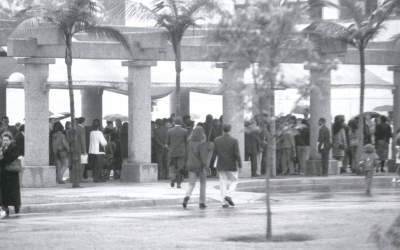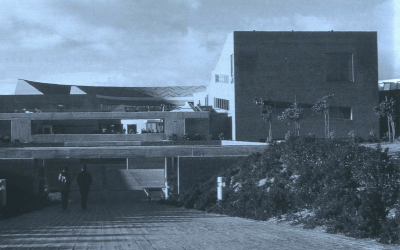When the Disciple is Ready
A University Student’s Testimony about Work with Street Vendors
“Not too long ago a street vendor told me he was meeting with other colleagues and with several Universidad de los Andes professors in order to see how some difficulties in their trade could be overcome. I attended a pair of these meetings in which a noticeable general skepticism permeated. My relationship with the street vendors began once again after I decided to undertake a “guided project” to study some of the coexistence processes within the Friends of the Andes group. The group was discussing how to legitimate the work of selling products and working on the street in the informal sector. Regardless of internal divisions, I no longer found the earlier skepticism and found their bonds to be much tighter. It was always clear to me that my role there could not be that of a protagonist, but rather of a facilitator and witness of what they were experiencing. To assume this role followed an ethical principle but also a practical logic: it is not efficient for an external agent to decide which road to take. The internal logic of an organization differs greatly from how one thinks it should function. In this sense, my relationship with the Friends of the Andes was a small reality check since some of their achievements were realized by means of a logic that, for me, was not ideal. This is a great lesson which has allowed me to work with the Friends of the Andes. In the universities the idea that we are the future of the nation is always emphasized; it is assumed that we are the ones who “know” and are able to understand the world, and for that reason we ought to be the ones who correct the errors that surround us. In other words, we are taught to intervene. I have learned that some matters are not like that: there are other methods of learning—beyond those of pure intellectualism—that are equally valid and actually more appropriate at times to resolve certain problems. If we assume this responsibility of facilitators, and not of supervisors, we can be more useful in these types of activities; the supervisor can rarely contradict him or herself nor remain disqualified in the face of those who intervene…And what was learned?
Having completed my project, I distanced myself from the group and I heard of some problems that practically dissolved the organization. Recently, I was again able to accompany the street vendors to a meeting. At the last session, I still perceived some of the old disagreements. Nevertheless, in a matter of seconds, everyone decided to put together a collection to help one of the vendors who was in very bad health. Another meeting was set and nothing else was said. In the end, though, we all left with our backs a little straighter, knowing that little by little, the street vendors were learning to provide for themselves, not because someone from the Andes has shown them how and why to do it, but rather because they themselves have decided to do so.”
Cuando el discípulo está listo
El testimonio de un estudiante sobre trabajo con los vendedores ambulantes
Por Andrés Barragán
“No hace mucho un vendedor ambulante me contó que estaba reuniéndose con otros colegas y con algunos profesores de los Andes, para ver cómo podían superar algunas dificultades. Asistí a un par de reuniones en las que primaba un escepticismo general. Mi relación con los vendedores ambulantes se reinició meses después cuando decidí hacer un ‘proyecto dirigido’: estudiar algunos procesos de convivencia en el interior del grupo Amigos de los Andes. En el grupo estaban discutiendo la legitimación del trabajo de la venta ambulante. No obstante las divisiones internas, ya no encontraba el escepticismo de antes y pude ver vínculos más estrechos. Siempre tuve claro que mi papel allí no podría ser protagónico sino de facilitador y testigo de lo que ellos vivían. Asumir este papel seguía un principio ético pero también una lógica práctica: no es eficaz que un agente externo decida el camino por tomar. La lógica interna de una organización difiere profundamente de cómo uno creería que debería funcionar. En este sentido, mi relación con los Amigos de los Andes fue un pequeño choque con la realidad, pues algunos de sus logros se llevaron a cabo a través de una lógica que para mí no era la ideal. Esta es la gran lección que me ha dejado trabajar con los Amigos de los Andes. En las universidades se subraya siempre la idea de que nosotros somos el futuro de la nación; se presupone que somos los que “sabemos” y podemos entender el mundo, y por eso debemos ser quienes corrigen los errores a nuestro alrededor… se nos enseña, en otras palabras, a ser interventores. He aprendido que las cosas no son así: hay otro tipo de aprendizajes—más allá de los puramente intelectuales—que son igualmente válidos e incluso más apropiados a la hora de resolver ciertos problemas. Si asumimos esta responsabilidad de facilitadores, que no de interventores, podemos ser más útiles en este tipo de actividades; el interventor rara vez puede contradecirse ni puede quedar descalificado ante quienes interviene… ¿y su aprendizaje?
Después de hacer mi proyecto tuve que distanciarme del grupo y supe de problemas que prácticamente disolvieron la organización. Por estos días pude acompañar de nuevo a los vendedores que están reuniéndose otra vez. En la última sesión todavía percibí algunos de los desacuerdos de siempre. Sin embargo, en cuestión de segundos todos decidieron hacer una recolecta para ayudar a una de las vendedoras que estaba muy mal de salud. Se fijó una nueva reunión y no se dijo más, pero en el fondo todos salimos con la espalda un poco más erguida, sabiendo que poco a poco los vendedores ya están aprendiendo a pescar por sí mismos. No porque alguien de los Andes les haya mostrado cómo y por qué hacerlo, sino porque ellos mismos lo han decidido así. ”
Andrés Barragán is a senior at the Universidad de los Andes in Industrial Engineering.
Related Articles
On the Verge of Combustion
An exceptional narrative renewal is taking place in Colombia. And yet, there is neither a dazzling figure who has captured the hearts of million of readers in the continent, as Jorge Isaac, José Eustasio…
Colombian Immigration
A walk along Roosevelt Avenue in Jackson Heights, Queens, reveals the world of Little Colombia: neighborhood streets lined with small bakeries; the smell of fresh bread and arepas blend with the sounds of cumbia, the national musical style.
Bogotá Libraries
Last year, 9-year-old Jonathan Huertas and his three younger siblings spent their vacation indoors watching television—their mother was too afraid to let them play in the streets …




